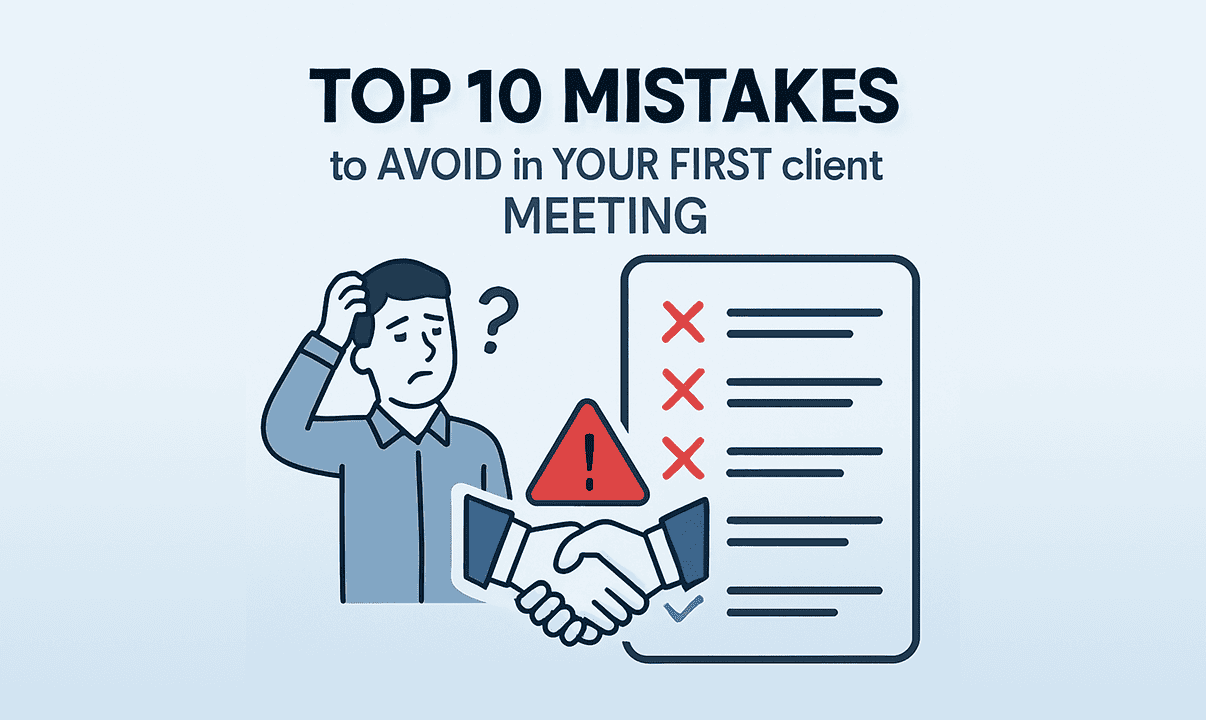Common pitfalls and how to make a confident, credible impression.
The first client meeting can make or break your professional relationship. It’s your chance to set the tone, build trust, and show that you’re the right person—or team—for the job. Whether you’re a freelancer, consultant, agency, or business owner, that first impression matters more than your pitch deck or pricing sheet.
But too many professionals fumble in those early moments—not because they’re unqualified, but because of avoidable missteps.
Top 10 Mistakes to Avoid in Your First Client Meeting
Here are the top 10 mistakes to avoid in your first client meeting—and how to ensure you walk out leaving a confident, credible impression.
1. Walking In Unprepared
Mistake: Showing up without knowing the client’s business, goals, or challenges.
Fix: Do your homework. Review their website, recent news, social media, and competitors. Understand their industry language and current pain points. Preparation reflects professionalism.
2. Talking Too Much, Listening Too Little
Mistake: Dominating the conversation with your pitch or services.
Fix: Ask open-ended questions and truly listen. Your goal is to understand before you propose anything. Remember: the more the client talks, the more insight you gain.
3. Skipping the Agenda
Mistake: Letting the meeting run without structure.
Fix: Start with a simple outline:
“Just to keep us on track, I’d love to cover X, Y, and Z in the next 30 minutes. Sound good?”
It shows leadership and time respect—two things clients love.
4. Overselling Too Early
Mistake: Jumping into pricing or pitching before understanding the client’s needs.
Fix: Take time to diagnose their situation. Think like a doctor—you wouldn’t prescribe before asking questions. Build a solution with them, not at them.
5. Using Too Much Jargon
Mistake: Overloading the conversation with technical or industry-heavy language.
Fix: Keep things clear and conversational. Simplicity doesn’t dilute your expertise—it amplifies it. Your client needs to feel confident they understand what they’re investing in.
6. Being Too Casual (or Too Formal)
Mistake: Coming across as overly relaxed or overly stiff.
Fix: Read the room and mirror their tone. If they’re corporate, maintain professionalism. If they’re relaxed, warm up your tone—but keep it respectful and focused.
7. Ignoring Body Language
Mistake: Focusing only on your slides or notes, missing visual cues.
Fix: Maintain eye contact, smile, nod when they speak, and watch their expressions for interest or hesitation. Non-verbal signals often speak louder than words.
8. Not Taking Notes
Mistake: Trusting memory alone for important client inputs.
Fix: Take light, active notes—especially when they share goals, concerns, or decision-making timelines. It shows attentiveness and ensures accurate follow-ups.
9. Ending Vaguely
Mistake: Wrapping up with “Let’s touch base soon.”
Fix: Be specific about next steps:
“I’ll send a proposal by Thursday, and we can schedule a review early next week—how does Monday 11 AM sound?”
Clear actions give confidence that you’re organized and committed.
10. Not Following Up
Mistake: Waiting for the client to reach out after the meeting.
Fix: Send a thank-you email within 24 hours, recapping key discussion points, deliverables, and deadlines. It leaves a lasting, professional impression.
✅ Bonus Tip: Show Enthusiasm—Genuinely
While professionalism is important, don’t forget to let your passion shine through. Clients want to work with people who want to work with them.
Say things like:
“I’m genuinely excited about the potential to work together.”
“I believe we can bring real value to your vision.”
Authenticity sells better than any pitch.
💬 Final Thoughts
Your first client meeting is more than a formality—it’s a chance to build trust, showcase your clarity, and plant the seeds for a strong partnership. Avoiding these ten common mistakes doesn’t require genius—just intentionality and empathy.
So prep well, listen more than you speak, and end with clarity. Do that, and clients won’t just remember you—they’ll want to work with you again.
